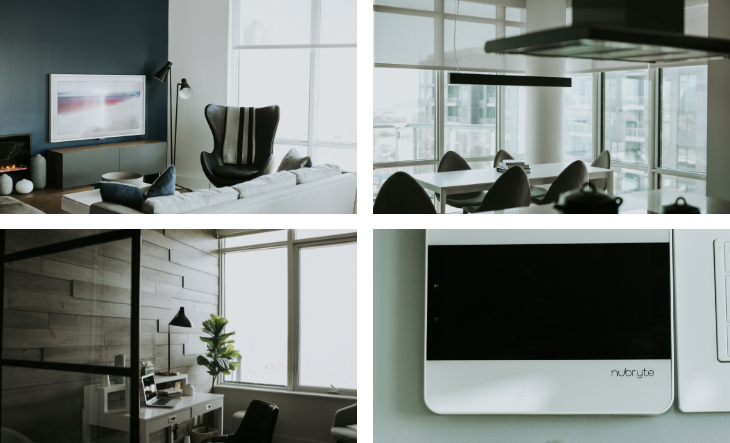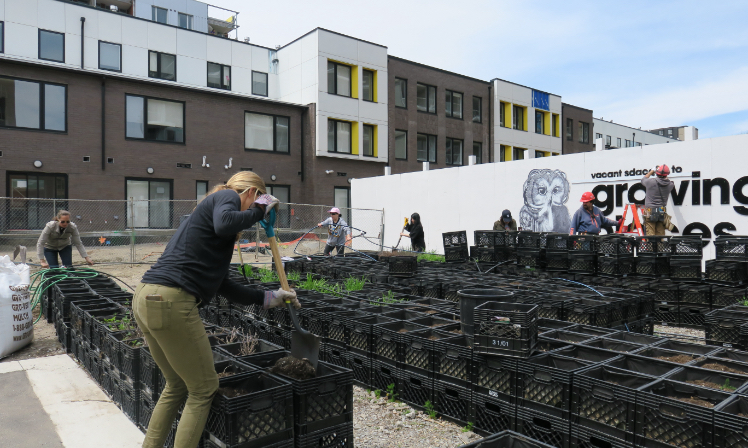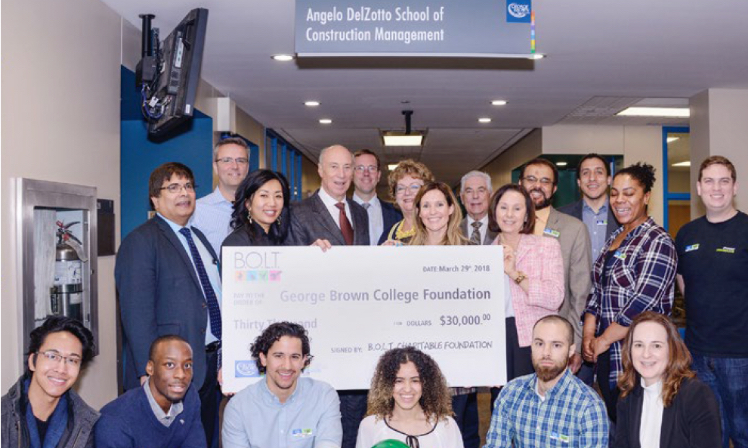Innovation
Our ecosystem of vertically integrated companies is testament to innovation being at our core. Each of our companies has been created from the simple, yet surprisingly progressive concept of recognizing the needs of and listening to our customers, as well as studying trends that allow us to anticipate changes in our market and industry.
We are constantly looking for ways to improve how and what we do; constantly looking to be better. And it’s not about outdoing something that has already been done – we like to think about what hasn’t been done. That is what makes us profoundly different.
Research & Development
A residence that responds. An experience designed to perform. The Innovation Suite synchronizes the natural and built environments, with a fleet of advanced technology, power networks and smart features that reduces carbon emissions, optimizes energy efficiency and fosters personal wellness. From the architectural envelope to the water and air filtration systems, and cutting-edge solar panels and smart thermostats, every element has been carefully chosen to reduce environmental impact while ushering in the future of sustainable living.
Tridel’s first smart condominium, Ten York, features Tridel Connect, an innovative range of integrated smart home features designed to make condo living as convenient as possible. Tridel Connect makes it easier to do everyday tasks like enter and exit your home, manage temperature settings and the suite alarm system, host guests and receive packages. Highlights include:
- Voice Controlled System Control Panel:
Centralized system for controlling lighting, audio, and window coverings via voice, phone, or touch; includes an ultra short-throw laser projector for 100" HD viewing.
- Preprogrammed Scenes:
Voice-activated system that allows residents to personalize their home with lighting, music, and blinds with a single command.
- JennAir Noir Series Column Fridge:
Smart fridge that can be monitored and managed via smartphone app.
- JennAir Noir Series Convection Oven:
Oven that can be preheated and controlled through a smartphone app.
- Touchless Kitchen Faucet:
Responds to commands for specific amounts of water without physical contact.
- Glass Partition (Principal Bedroom):
Transitions from opaque to transparent with a touch of a button.
- Smart TV (Camouflaged as Art):
Mounted above an electric mist fireplace, blends into the décor when not in use.
- Electric Mist Fireplace:
Provides a flickering flame effect, enhancing the atmosphere of the room.
- Smart Mirror
Voice-controlled mirror with adjustable lighting settings.
- Smart Shower (Ensuite Washroom):
Allows voice control of water temperature and flow rate.
- AV-Connected VibrAcoustic Bath:
Uses sound to vibrate the water
The suite allows homeowners to rely on voice and data connectivity within the building, a benefit that has become very important as a growing number of consumers no longer have landlines or cable and require robust Wi-Fi.
Expanding on Tridel’s smart home integration features within Ten York, the showcase Innovation Suite takes smart-living a step further and merges technology and design seamlessly to provide incredible connectivity, comfort and convenience. Every component and system of the Ten York Innovation Suite is designed to improve how residents experience their home, with technology-driven features that enhance their lifestyle and create an unparalleled experience in luxury condominium living.
The Net Zero Energy Dwelling, or NetZED, is powered by renewable electricity and hot water all year round. This means the total amount of electricity produced from the sun during the year is equal to the electricity consumed by the suite during that year. Electricity is harnessed from solar panels on top of the NetZED home. During the day, excess energy is shared with the rest of the building to offset the home’s energy needs at night.
The NetZED concept is applied to every aspect of the home. From appliances and lighting to linens and mattresses, every finish, feature, and piece of furniture tells a green story. This includes:
- Domestic Hot Water: GE Hybrid Heater
Uses high-efficiency refrigerant technology for water heating instead of natural gas.
- Washer & Ventless Dryer
Utilizes a new heat pump technology for more efficient drying and lower energy use.
- Heating and Cooling Variable Refrigerant Flow (VRF)
All-electric system that saves energy, allows for separate zone adjustments, and operates at varying speeds.
- Lighting: LED System
Reduces power consumption with task lighting, dimmers, and directional pot lights.
- Ventilation: Reversomatic ERVs
Pre-conditions outdoor air to reduce HVAC loads and recovers heat and moisture for better indoor environment.
- Vent Boxes
Preformed for improved performance of intake and exhaust systems.
- Solar Panels and Battery
Stores power from a 7KW solar photovoltaic system on the roof for use during low production times and optimizes performance based on energy data.
- Wallpads & Switches: Nubryte Smart Home Automation
Controls lighting via kiosks, wall switches, phone, and voice assistants, integrating with the suite’s energy system.
- Bi-directional Meter and Circuit Level Metering
Provides detailed energy consumption data and measures energy flow in and out of the suite
- Window Screen: Pleximesh
Blocks dust, pollen, and insects while allowing windows to remain open during rain, with enhanced thermal and noise-reducing properties.
- Thermal Breaks
Insulated section in the balcony slab to reduce heat loss by 90% from thermal bridging
- Soffit Assembly Clips
Fiberglass clips installed to connect interior and exterior soffit assemblies, reducing thermal bridging and limiting thermal transfer between the suite and exterior.
- T5 Series Window Frames
T5 series frames offer greater thermal resistance and a better thermal break than conventional frames.
The NetZED suite is located on the penthouse level in the north tower of Aqualina at Bayside, a LEED-Platinum community by Hines and Tridel on the Toronto Waterfront. Tridel and Hines were recognized for the NetZED suite with the Inspiring Home Award at the Canadian Building Council Awards. This award was presented to those responsible for outstanding achievements of a high-performing sustainable residential project in Canada. Winning this award demonstrates a healthy and sustainable living environment for people, contributes to a better community and proves a commitment to sustainability.

For the last 150 years, residents have been able to control air temperature in their homes using a thermostat - a great leap forward in thermal comfort. Located typically on a home’s interior walls, thermostats often miss heat loss and heat gain conditions occurring at the exterior walls. In multi-unit residential building construction practices, this commonly occurs where the interior floor concrete slab runs directly to the outdoors and connects to the balcony floor concrete slab. In Canada, during the cold winters, this continuous slab connection provides an easy path for cold to migrate into the building causing a section of floor to be cold along the exterior wall.
To mitigate this weakness, improve thermal comfort, and prevent this cold floor scenario, we’ve conducted a study at our Bloor Vista project to focus on building envelope performance. The study used thermal sensors in five different concrete slab balcony thermal break configurations and their effectiveness in stopping heat energy transfer from the indoors to the outdoors. The top performer demonstrated over a 25% reduction in heat loss on a typical balcony.
We have since installed thermal breaks to separate the interior and exterior concrete slabs on all balconies at our Aqualuna and Aquabella community, and plan to apply these findings on future projects. These thermal breaks have proven to reduce heating loss from the interior of a building by up to 90%, enhancing the overall energy efficiency and resulting in up to 15% lower energy costs.
The study involved using a blower door assembly mounted on a balcony door of a suite to pressurize a single floor to 50 Pascals, mimicking stack effect. By sealing various components like suite doors, garbage chutes, and elevators, a remarkable 71% reduction in relative airflow was achieved. These findings offer valuable insights for future design improvements. Applying these insights can result in reduced stack effect, subsequently reducing the need for higher volumes of corridor pressurization air resulting in enhanced energy efficiency, lower heating and cooling expenses, superior indoor air quality, and an overall improvement in occupant comfort.
Several suites within Tridel at The Well Signature Series feature humidifiers integrated within the fan coils. These help to reduce heating costs and energy consumption as higher levels of indoor humidity during the winter can make it feel warmer, therefore increasing resident comfort, even at a lower thermostat setpoint. Additional benefits include improved respiratory, skin and sinus health, as well as protecting wood furniture and floors from drying out, cracking or warping.
The Well has also incorporated 6-way valves into the fan coils. A 6-way valve in a fan coil unit controls the flow of water through multiple pathways, enabling efficient heating, cooling, and temperature regulation. Unlike traditional systems with separate coils for heating and cooling, which require the fan to push air through two distinct coils, a 6-way valve enables a single coil to handle both functions. This reduces the fan's workload, as it only needs to overcome the resistance of one coil, leading to operational savings and lower energy consumption.
In September 2022, Tridel collaborated with Kite Mobility and SWTCH to implement a sustainable transportation amenity at Bianca. This service, comprising eight bikes and three cars, offers electric rideshare options for residents and guests, providing a cost-effective alternative to traditional car ownership by eliminating expenses such as vehicle purchase, maintenance, insurance, and parking spot rentals. Residents and guests benefit from flexible and efficient electric rideshare options without the long-term financial commitments associated with personal vehicle ownership. The electric bikes not only add to the convenience of the amenity but also encourage the community to engage in physical activities, fostering a healthier lifestyle among its residents and guests.
One of the cars in the fleet utilizes Vehicle-to-Grid (V2G) charging technology to enable the vehicle to draw power from the grid and feed excess energy back to the grid, balancing demand and supply fluctuations. Additional power generation sources, often non-renewable and less efficient, must be brought online during peak demand. Minimizing peak demand supports the use of cleaner and more sustainable energy sources, reducing the overall carbon footprint. In approximately one year of operation, this initiative has saved over 5800 kg of CO2e.
Moreover, the chilled water goes through a cooling loop beneath the downtown core and can be used for air-conditioning, while additional water goes through a heated loop that uses heat from an existing heated plant to deliver effective and lower carbon heating to The Well’s residents as well as those around the city – this is known as district energy.
Sustainable Living
In 2004, Tridel committed to sustainable building practices by joining the Canadian Green Building Council (CaGBC). By 2006, Tridel committed all new developments to adhere to LEED standards.
LEED, or Leadership in Energy and Environmental Design, is an internationally recognized certification system that promotes sustainable building practices by assessing factors such as energy efficiency, water usage, and overall environmental impact.
Since making this commitment, Tridel has emerged as Canada’s leading developer of green condominiums, delivering over 24,000 environmentally-friendly suites. Tridel has played a key role in advancing green building practices in Canada, contributing to more than 20% of the country’s commercially certified LEED multi-unit residential buildings.
Low Carbon District Energy (Deep Lake Cooling), improving energy efficiency, resiliency and reducing emissions.
District energy uses a centralized system to produce and distribute thermal energy to multiple buildings within a specific area for heating and cooling purposes. This system improves efficiency by consolidating energy production, resulting in lower greenhouse gas emissions and reduced pollutants compared to individual heating and cooling systems.
Tridel embraced this technology in 2003 by building Element, one of the first residential developments to connect to Enwave District Energy in the City of Toronto. In 2006, Circa became one of the first residential buildings to connect to Markham district energy. Since then, we have connected The Well Signature Series (756 suites) in 2023, and another 915 suites are anticipated to be operational by 2028, followed by 2,000 additional suites operational by 2035.
The Well Signature Series utilizes a unique and leading-edge district energy solution that incorporates a thermal battery, setting it apart from other district energy solutions around the globe. Situated below the site, the thermal battery is an excavated cistern (80 metres deep by 15 metres wide) that holds 7.6 million litres of water.
Energy is generated using water pulled from Lake Ontario into a Deep Lake Water Cooling (DLWC) system, and high-efficiency hot water heating plant. Compared to conventional systems, DLWC uses up to 90% less electricity and eliminates ozone-depleting emissions. Designed to store energy during off-peak times, the system eases strain on the electricity grid, and reduces homeowner utility and maintenance costs.
At Tridel, we are committed to creating sustainable living spaces that prioritize energy conservation and comfort for our residents. One key feature that sets our condominiums apart is our innovative approach to ventilation and air quality management. Each suite within our developments is equipped with an advanced Energy Recovery Ventilator (ERV) system. This technology ensures that fresh outdoor air is efficiently circulated into the suite, promoting a healthy indoor environment.
Our ERV systems are designed to recover 60-70% of the energy from outgoing air. This means that even as stale air exits the suite, its thermal energy is captured and repurposed to pre-condition the incoming fresh air. During winter months, this reclaimed energy is utilized to warm up the incoming air, providing comfort without excessive energy consumption. In the summer, the system reverses its operation, using the waste energy to cool down the incoming air, thus maintaining a pleasant indoor climate year-round.
For other energy efficient initiatives, see The Well Airtightness Pilot, Bianca V2G Charging and Micro-Mobility Pilot, and The Well Innovation Suite Sections.
Tridel's developments consume 35% less electricity, 54% less natural gas, and exhibit 41% lower greenhouse gas emissions compared to standard building code compliant projects. This equates to a substantial energy preservation of 4.4 billion megajoules and a reduction of 182.6 million kilograms of carbon dioxide emissions. These impressive savings are achieved through various high-performance technologies and features, including double low-emissivity coated windows, balcony thermal breaks, optimized window-to-wall ratios, low carbon district energy solutions, variable speed drives, and variable refrigerant flow heating and cooling systems.
Additionally, Tridel integrates sustainable elements such as rooftop solar panels, in-suite IoT programmable thermostats, energy recovery ventilation systems, sub-meters for personalized consumption data, and energy-efficient LED lighting with automated controls.
Looking ahead, Tridel is committed to addressing climate-related challenges and achieving zero carbon operational emissions. Our goal is for all developments commencing planning from 2028 and onward, with construction in or after 2030, to achieve near zero operational emissions of 5kgCO2e/m2/yr and maintain an energy use intensity below 75kWh/m2/yr. We are also planning the launch of two fully electrified buildings. These will rely solely on electric systems for heating, cooling, and hot water, eliminating the need for natural gas and further reducing greenhouse gas emissions.
Tridel is deeply committed to sustainable practices across various aspects of construction and development. During the construction phase, waste diversion initiatives are employed to ensure materials like wood, scrap metal, drywall, concrete, and cardboard are recycled, leading to an average diversion rate of 85% of construction waste. We collaborate with suppliers to achieve local sourcing targets of at least 30% of construction materials by cost within an 800km radius and incorporate a minimum of 20% recycled content in construction materials.
Tridel is committed to significantly reducing Scope 3 GHG emissions intensity from purchased goods by 90% from our 2022 baseline. Efforts to reduce embodied carbon emissions are a focal point, with Tridel conducting life cycle assessments and adjusting designs to achieve reductions. Technologies such as prefabricated construction and carbon sequestration, like Carbon Cure, are integrated to lower both embodied carbon emissions and waste, while enhancing construction efficiency. Strategies include central waste collection systems, individual suite waste sorting mechanisms, and storage provisions for textiles, bulky waste, and hazardous materials. Training and educational sessions are provided to ensure proper waste diversion within the community. At our head office, waste diversion events are held for employees during our annual Waste Reduction Week. Employees are encouraged to bring in electronic and textile waste, aiming to build awareness of responsible waste diversion practices and tools to reduce their household waste.
In our commitment to resilience and building environment quality, we have implemented several innovative features in our new developments. We prioritize the creation of 'Resilient Spaces', ensuring that residents have a safe refuge during power outages. These spaces are equipped with essential amenities such as electricity, water, heating, ventilation, air conditioning, refrigeration for medication storage, Wi-Fi, and mobile charging stations with USB ports. Outlined in our updated Design Guide, since December 2021, select communities developed from January 2022 onwards have integrated these crucial features to provide residents with peace of mind during emergencies.
Another resiliency initiative includes a comprehensive leak detection solution in our design practices. The Well Classic Series I being the pioneering community, sensors detect and alert users to any leaks within the suite's HVAC system. As well, valves positioned at the top and bottom of each HVAC piping riser enable isolation of leaks, minimizing potential damage and ensuring the safety and security of our residents.
Tridel recognizes its role in the land it develops upon and takes responsibility to minimize the effects of development on the surrounding environment. Bird-friendly glass using imprinted fritting patterns is a key aspect, the patterns make the glass more visible to birds, preventing unnecessary collisions and bird fatalities. At FORM, the innovative use of biomimicry, which included ultraviolet spiderweb designs on the glass, exemplifies this commitment. Biomimicry is the process of designing materials, structures, and systems based on biological processes and entities. It involves using natural processes and designs as inspiration to improve human engineering.
Additionally, our outdoor lighting adheres to Dark Sky compliance, with controlled timers for architectural illumination to respect natural light and dark cycles, benefiting plant and animal reproduction, sleep, and protection. Landscaping focuses on native plants, pollinator gardens, and safeguarding existing species. Urban heat island effects are reduced by treating hardscapes with green roof and cool paving strategies, including the use of ultra-lightweight GaiaSoil.
Tridel's dedication extends to urban agriculture through The Bowery Project, converting vacant spaces into gardens that supply fresh produce. This project has allowed us to provide fresh food to local charities, local restaurants or food providers, as well as engage the community through fun, creative and educational programs. Alexandra Park showcases this initiative, utilizing garden-grown herbs and vegetables for local cooking and food security efforts. Looking ahead, Tridel envisions an indoor vertical farming amenity for condo residents, providing year-round growing opportunities with resource-efficient practices.

Technology & Connectivity
Building Information Modeling (BIM) is a technology that uses virtual reality to represent physical space digitally and offers extremely realistic 3D depictions.
Tridel has recently partnered with the University of Toronto and Residential Construction Council of Ontario (RESCON) to pilot BIM technology at our Via Bloor community. By using this technology, residents are able to walk through common element spaces in the community and get a better understanding of the look and feel.
Looking forward we hope to use this technology to further enhance the customer experience and allow our future residents to get an exclusive look at their homes prior to the construction of their suite. Not only will BIM revolutionize the home buying journey, but it will also enhance the experience for consultant and trade partners.
To combat poor cellular connectivity, Tridel deploys Distributed Antenna Systems (DAS) in select areas of a building. The DAS captures the signal via an antenna outside of the building, boosts that signal, and distributes the signal where required. Additionally, Tridel allows connectivity in common areas by implementing seamless and secure Wi-Fi networks. These networks are designed to provide residents and guests with reliable, high-speed internet access throughout shared spaces, ensuring a consistent and secure wireless experience.
At Tridel, we integrate smart technology throughout our buildings to deliver a seamless living experience. For access control systems, our approach focuses on providing secure entry by requiring a key fob, phone fob, or keypad at every access point. In suite, smart features enhance comfort and convenience, allowing for personalized control of your environment. A wall pad acts as a central hub for controlling features, including:
- Climate Control:
Adjust the heating and cooling systems to your preferred settings - Lighting:
Customize lighting settings, including dimming and scene setting. - Smart Blinds:
Control the amount of natural light entering your space with automated blinds.
Tridel also incorporates various amenities through the Tridel Connect app. This app allows residents to:
- Monitor Parcel Delivery:
Keep track of deliveries and manage packages. - Book Amenities:
Reserve common spaces and facilities. - Manage Services:
Request maintenance and access other building services.
This integration of smart technology and convenient app-based controls ensures a modern, connected living experience for all Tridel residents.
Social
Community Economic Development (CED) is action taken locally to help create better social conditions and economic opportunities, particularly for those who are most marginalized. This approach recognizes that social, economic and environmental challenges are complex, independent and ever-changing. To be effective, the solution to these challenges must come from local knowledge and be led by members of the community.
At Tridel, our journey within a community doesn't end when construction does. We work with volunteers, staff, community leaders and members to implement events and programs that help bring those in the community together. On an ongoing basis, Tridel takes part in several initiatives that help promote food security, improve health and well-being, and provide greater access to opportunities for career growth and development.
Building Opportunities for Life Today (BOLT) is a charitable foundation established by Tridel in 2009. This foundation started with a simple concept: to provide learning and awareness opportunities for youth to the field of construction. By establishing additional community, government and industry partnerships, BOLT has since expanded to reach an even broader youth audience.
To create awareness about the construction industry, we host events such as Day of Discovery, Speak Outs and job shadowing experiences which allow the under-resourced youth within our city to gain hands-on experience and exposure to opportunities that are destined to pave the path for a forever career.
Working with our Take Action Team, an internal group of staff volunteers, we also host fundraisers and events to raise awareness and resources to support scholarships and training opportunities. To date, BOLT has provided over 350 scholarships. These financial awards are presented to under-resourced youth wishing to pursue a post-secondary program in construction.

In order to promote a heathier lifestyle for our new homeowners, we have implemented initiatives to animate spaces within our buildings that are less commonly used, such as stairwells, in the hopes to encourage well-being and physical health, while also increasing the chance to connect and engage with neighbours. To date, we have painted the stairwells in our Ten York and SQ2 communities.

The Angelo DelZotto School of Construction Management can be found at George Brown College and offers eight programs including Ontario’s only four-year degree program in construction management. With hands-on education, the ADZ School of Construction delivers high-quality graduates with skills employers need and want.
Working closely with the college, many of our Community Economic Development and BOLT Foundation events take place with George Brown. By hosting Days of Discovery and Speak Outs, we not only expose youth to the construction industry but also to the learning facilities that cater to this education.
Many of our financial awards are presented to outstanding individuals who go on to complete a post-secondary education at George Brown College.


